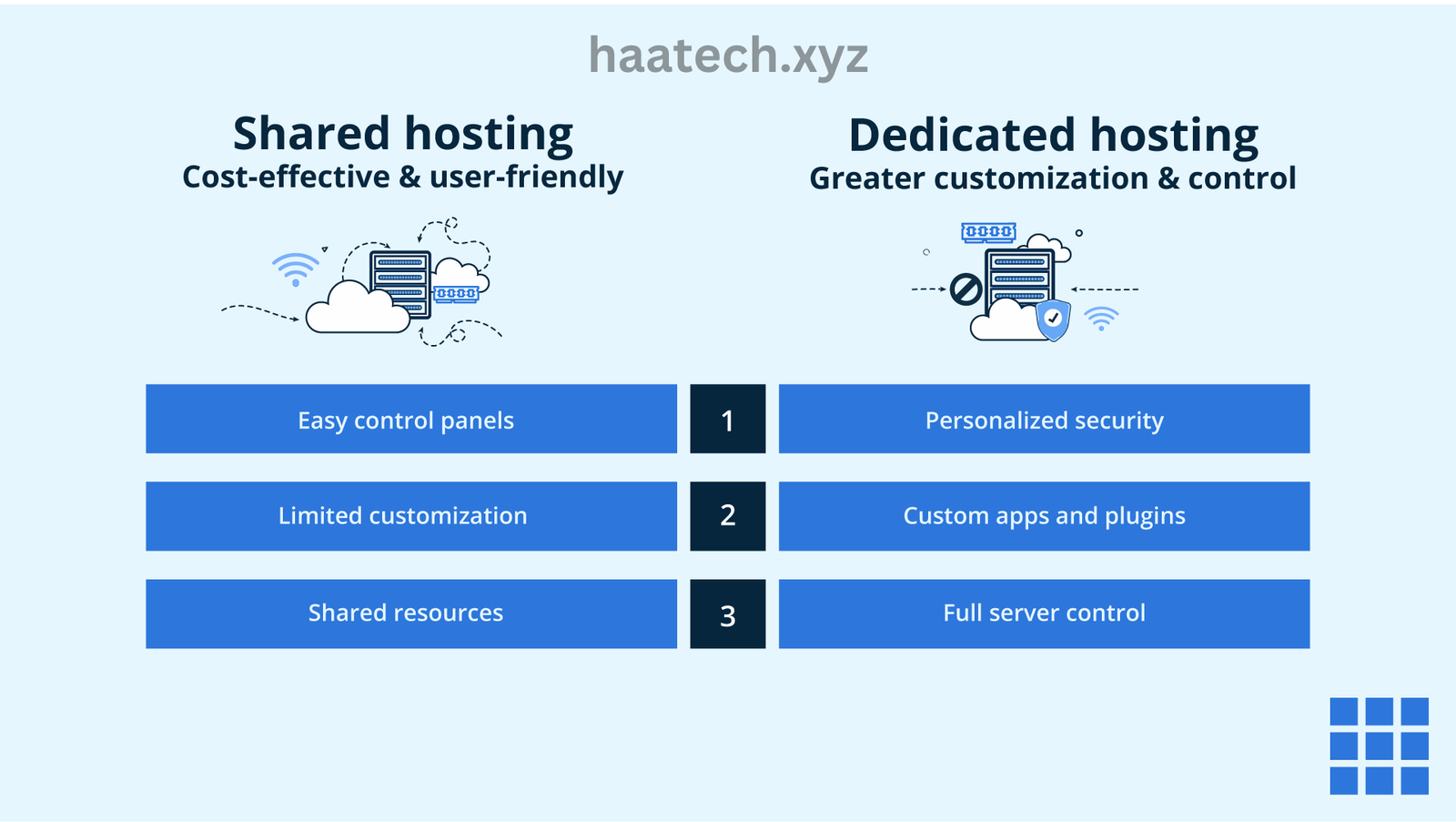Introduction
When you’re launching a website, one of the first decisions you’ll make is choosing the right web hosting plan. The type of hosting you select can significantly impact your website’s performance, security, and growth potential. Among the many options available, shared hosting and dedicated server hosting are two popular choices. But how do you decide which one is right for you? Let’s break it down step by step.
Overview of Shared Hosting
What is Shared Hosting?
Shared hosting is a type of web hosting where multiple websites are hosted on the same server. Essentially, you’re sharing server resources—like storage, bandwidth, and processing power—with other users.
How Shared Hosting Works
Imagine renting a room in a house with several roommates. While you have your own space, you share common areas like the kitchen and bathroom. Similarly, in shared hosting, your website resides on a server alongside others, using a portion of its resources.
Benefits of Shared Hosting
Cost-Effectiveness
Shared hosting is one of the most affordable hosting options available, making it ideal for small businesses, bloggers, and personal websites.
Ease of Use
Most shared hosting plans come with user-friendly control panels, making it easy for beginners to set up and manage their websites without technical expertise.
Limitations of Shared Hosting
Performance Issues
Since resources are shared, high traffic on one website can affect the performance of others on the same server.
Security Concerns
Shared hosting environments are more vulnerable to security threats. If one website is compromised, others on the server could also be at risk.
Overview of Dedicated Server Hosting
What is Dedicated Server Hosting?
Dedicated server hosting provides an entire server exclusively for your website. Unlike shared hosting, you don’t share resources with anyone else.
How Dedicated Hosting Works
Think of it as owning your own house. You have complete control over the space, and no one else has access to it. In dedicated hosting, you get full access to the server’s resources, which you can configure and use as needed.
Benefits of Dedicated Server Hosting
Superior Performance
With dedicated resources, your website can handle high traffic and resource-intensive applications without lagging.
Enhanced Security
Since you’re the only user on the server, you can implement advanced security measures to protect your data.
Full Control and Customization
Dedicated hosting gives you the freedom to customize server settings, install software, and manage configurations to suit your specific needs.
Limitations of Dedicated Server Hosting
Higher Costs
Dedicated hosting is significantly more expensive than shared hosting, which can be a barrier for small businesses and startups.
Complexity in Management
Managing a dedicated server requires technical knowledge, or you’ll need to hire an expert.
Key Differences Between Shared Hosting and Dedicated Hosting
Performance Comparison
Shared hosting can slow down during peak usage, while dedicated hosting offers consistent, high-speed performance.
Security Comparison
Shared hosting is more vulnerable to cyber threats, whereas dedicated hosting provides a more secure environment.
Cost Comparison
Shared hosting is budget-friendly, while dedicated hosting comes with a premium price tag.
Scalability Comparison
Dedicated hosting is better for websites expecting significant growth, while shared hosting is ideal for smaller, less resource-intensive websites.
Management and Control
With dedicated hosting, you have complete control, while shared hosting limits customization options.
How to Choose the Right Hosting for Your Needs
Assessing Your Website Requirements
Consider your website’s purpose, expected traffic, and resource needs. A small blog has different requirements than an e-commerce site.
Budget Considerations
If cost is a major factor, shared hosting may be the better choice. However, if performance and security are non-negotiable, invest in dedicated hosting.
Growth Potential of Your Website
If you anticipate rapid growth, dedicated hosting offers better scalability.
Technical Expertise
Choose shared hosting if you’re not tech-savvy. Opt for dedicated hosting if you or your team have the skills to manage it.
Pros and Cons of Shared Hosting
Advantages
- Affordable and beginner-friendly
- Easy to set up and manage
Disadvantages
- Limited resources
- Security risks
Pros and Cons of Dedicated Server Hosting
Advantages
- High performance and reliability
- Enhanced security and control
Disadvantages
- Expensive
- Requires technical expertise
Who Should Choose Shared Hosting?
Best Use Cases for Shared Hosting
- Personal blogs
- Small business websites
- Startups with limited budgets
Who Should Choose Dedicated Server Hosting?
Best Use Cases for Dedicated Hosting
- High-traffic websites
- E-commerce platforms
- Businesses needing enhanced security
Conclusion
Choosing between shared hosting and dedicated server hosting depends on your website’s needs, budget, and technical expertise. Shared hosting is cost-effective and beginner-friendly, while dedicated hosting offers superior performance and control. Evaluate your requirements to make the best decision.
FAQs
1. What is the main difference between shared and dedicated hosting?
Shared hosting shares resources among multiple users, while dedicated hosting provides exclusive resources for a single user.
2. Is shared hosting safe for e-commerce websites?
It can be, but for enhanced security, dedicated hosting is a better choice for e-commerce sites.
3. How expensive is dedicated server hosting compared to shared hosting?
Dedicated hosting is significantly more expensive, often costing 5-10 times more than shared hosting.
4. Can I switch from shared hosting to dedicated hosting later?
Yes, most hosting providers allow upgrades as your website grows.
5. Do I need technical skills to manage dedicated hosting?
Yes, managing a dedicated server requires technical knowledge or assistance from experts.
